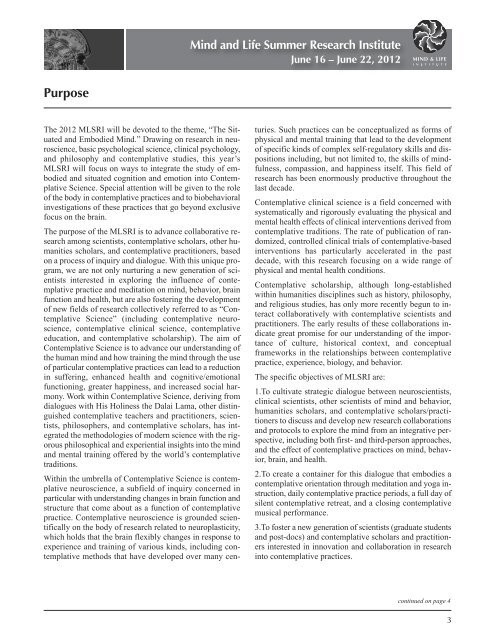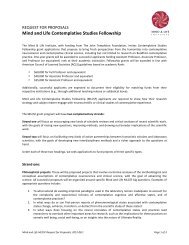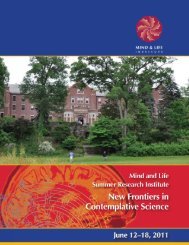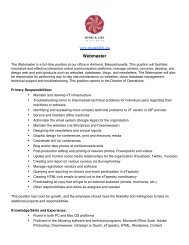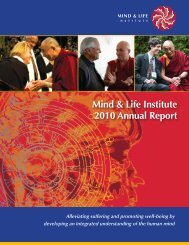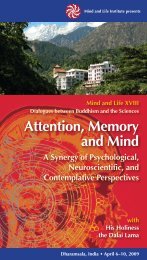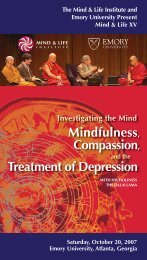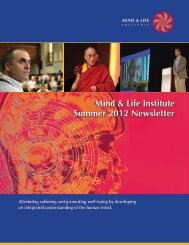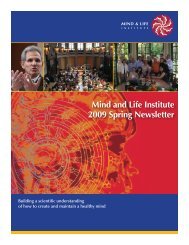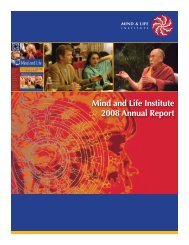CONFERENCE BROCHURE - Mind & Life Institute
CONFERENCE BROCHURE - Mind & Life Institute
CONFERENCE BROCHURE - Mind & Life Institute
Create successful ePaper yourself
Turn your PDF publications into a flip-book with our unique Google optimized e-Paper software.
<strong>Mind</strong> and <strong>Life</strong> Summer Research <strong>Institute</strong>June 16 – June 22, 2012PurposeThe 2012 MLSRI will be devoted to the theme, “The Situatedand Embodied <strong>Mind</strong>.” Drawing on research in neuroscience,basic psychological science, clinical psychology,and philosophy and contemplative studies, this year’sMLSRI will focus on ways to integrate the study of embodiedand situated cognition and emotion into ContemplativeScience. Special attention will be given to the roleof the body in contemplative practices and to biobehavioralinvestigations of these practices that go beyond exclusivefocus on the brain.The purpose of the MLSRI is to advance collaborative researchamong scientists, contemplative scholars, other humanitiesscholars, and contemplative practitioners, basedon a process of inquiry and dialogue. With this unique program,we are not only nurturing a new generation of scientistsinterested in exploring the influence of contemplativepractice and meditation on mind, behavior, brainfunction and health, but are also fostering the developmentof new fields of research collectively referred to as “ContemplativeScience” (including contemplative neuroscience,contemplative clinical science, contemplativeeducation, and contemplative scholarship). The aim ofContemplative Science is to advance our understanding ofthe human mind and how training the mind through the useof particular contemplative practices can lead to a reductionin suffering, enhanced health and cognitive/emotionalfunctioning, greater happiness, and increased social harmony.Work within Contemplative Science, deriving fromdialogues with His Holiness the Dalai Lama, other distinguishedcontemplative teachers and practitioners, scientists,philosophers, and contemplative scholars, has integratedthe methodologies of modern science with the rigorousphilosophical and experiential insights into the mindand mental training offered by the world’s contemplativetraditions.Within the umbrella of Contemplative Science is contemplativeneuroscience, a subfield of inquiry concerned inparticular with understanding changes in brain function andstructure that come about as a function of contemplativepractice. Contemplative neuroscience is grounded scientificallyon the body of research related to neuroplasticity,which holds that the brain flexibly changes in response toexperience and training of various kinds, including contemplativemethods that have developed over many centuries.Such practices can be conceptualized as forms ofphysical and mental training that lead to the developmentof specific kinds of complex self-regulatory skills and dispositionsincluding, but not limited to, the skills of mindfulness,compassion, and happiness itself. This field ofresearch has been enormously productive throughout thelast decade.Contemplative clinical science is a field concerned withsystematically and rigorously evaluating the physical andmental health effects of clinical interventions derived fromcontemplative traditions. The rate of publication of randomized,controlled clinical trials of contemplative-basedinterventions has particularly accelerated in the pastdecade, with this research focusing on a wide range ofphysical and mental health conditions.Contemplative scholarship, although long-establishedwithin humanities disciplines such as history, philosophy,and religious studies, has only more recently begun to interactcollaboratively with contemplative scientists andpractitioners. The early results of these collaborations indicategreat promise for our understanding of the importanceof culture, historical context, and conceptualframeworks in the relationships between contemplativepractice, experience, biology, and behavior.The specific objectives of MLSRI are:1.To cultivate strategic dialogue between neuroscientists,clinical scientists, other scientists of mind and behavior,humanities scholars, and contemplative scholars/practitionersto discuss and develop new research collaborationsand protocols to explore the mind from an integrative perspective,including both first- and third-person approaches,and the effect of contemplative practices on mind, behavior,brain, and health.2.To create a container for this dialogue that embodies acontemplative orientation through meditation and yoga instruction,daily contemplative practice periods, a full day ofsilent contemplative retreat, and a closing contemplativemusical performance.3.To foster a new generation of scientists (graduate studentsand post-docs) and contemplative scholars and practitionersinterested in innovation and collaboration in researchinto contemplative practices.continued on page 43


